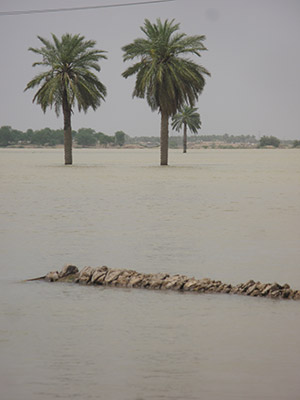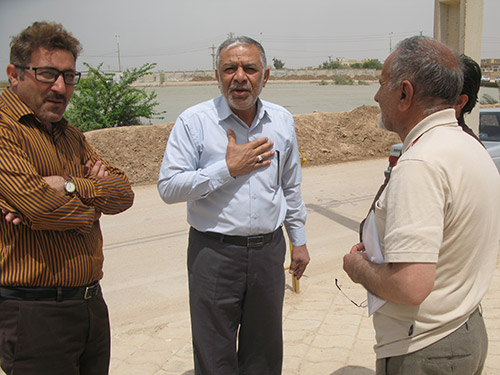Rainy Travel Log (VI)
Mohammad Hussein Ghadami
Translated by: Fazel Shirzad
2019-7-16
O my nice boys! Now, let us sing the song "I am a kind friend"; I take film
On Tuesday's night we arrive at Ahwaz's Art Center, but there was neither the head of news, nor caretaker to open door and welcome us. Of course, it's no good to make a date at the office ... Fortunately, it doesn’t last until the morning.... Fortunately, it will not be the morning. Half an hour later, good local accuser arrives, and then handsome and attractive man, Mr. Tabatabaei also comes with a tray of long Kebabs.
We open the door easily; it seems that it was a new and unfinished building and. The walls of room and hallway are decorated. There are photos and designs, paintings of artists of that area on the walls. We go to a small room of third floor.
Well, we know what we should do tonight; Seyed says goodbye and goes to visit the guests of house.
- Take a rest! Tomorrow we will have a visit to the camp of flooded people, the comrades will do cultural works there.
And now it's morning and the tomorrow of last night. Mr. Tarafi is one who we'll deal with. We go to Takhti Stadium with him. We get inside. The bus attracts me attention as if it is a mobile library for the children. Children's voice is heard. I will check the bus until the responsible officer came and we enter to the hall. The children are playful in bus, they don’t respect any rule!
The coach are shouting and trying to make them calm. She is happy for coming of new person to help her the make children calm. They become calm Just for two minutes.
The coach wants to keep honor
- Dear children, be quite! This man comes here to photograph you; first, clap him!
We are clapped by hands, feet and whistles and dancing and hawking! And coach says:
- Well done, well done! Now listen to a beautiful story what I want to tell you; once upon a time…
The children added: "There was no one except God."
-In Baghdad…
Suddenly her colleague enters.
- Oh guys, Look! Here is Ms. Gholami
Now, No one can control the children
-Oh guys, be quite! If someone is quite, Ms. Gholami will give him a gift.
But it doesn't work; all children was clapping, whistling and repeating:" I love you Ms. Gholami"
Keyvan is also here to take some photos
The coach does another trick.
Oh guys! Now, sing the song "I am kind friend…" and cameraman take film.
The children shout as much as possible and sing.
We prefer escape! We move toward the first hall, the public sports committee of Khuzestan. One who was in charge of the hall came and we enter into it by using ID card.
- Please do not take photo and video, it is forbidden!
The indoor salon is spacious. Each guest family is in a tent of Red Crescent. It is not pleasant for them to visit an uninvited guest, especially reporters with camera and pen. It not a suitable place to stay, we go to the Taekwondo martyrs sports club, which is a temporary nursery for the floodgates and it is a place for sports and entertainment of young children. The coaches of the club are successful. Here, coach speaks, not children. Tales, games and hobbies are so attractive that kids do not notice when we entered into there. Zarabi is talking warmly with the hosts at the corner of the club. Keyvan and I are going to do interview with a woman who is in charge of the club and programs.
Regarding the crisis that emerged, the Welfare Organization of Khuzestan province...
A chorus of children and coaches not get mixed up and make there noisy The coach is reminded that it is a little slower. Apparently, they are not too happy for visitors and reporters.
- Don't try to enter into our works; get out of the room and do your interview!
Keyvan continues to work.
- No problem lady, you can speak louder ... what age are they?
- The age group is three to six years old ...These children are the members of family whose farmland goes underwater. We created workshops for mothers. When the mother is calm, she has a baby.
What are you doing for children?
We prepare Breakfast, toys, games that help them to be calm down ... health education packages and etc.
-Are they fulfilled?
-Yes, a lot. Even, when they want to say goodbye; they usually say: "Lady, can you stay here further?"

Tales, games and hobbies are so attractive that children do not notice when we entered into there
We go to the children's playground. The coach reads a rhythmic poem and the children repeat.
-hello, hello everybody, hello to me, hello to you…
In the continue, the children sing a popular song
It is the end of class and programs. We join to the Zarabi’s friends. They are introduced individually.
- Mr. Pourvand, the literary director of province, Mr. Sariyan, the director of Theaters Offices, Zarei, Ms. Shojaei ...
They continue to talk. We move from the club to Karun.
-Now we are going to the Karun County, where all the palm trees, gardens with its citrus have gone underwater, people can't reach to other places.
Khuzestan is really damaged …the budget is not enough…there have not occurred any development for one year.
We stop at another side of bridge. A strange thing come out of the water, it looks like a crocodile; when we go ahead we find a large tree bole fallen in the water!

A large tree bole looks like a crocodile in the water
The guide points out another side of river
- On the other side there is a part called "Kot Abdollah" which is now called "Karun". Their congressman is also one of three congressmen of Ahvaz. They are Arabian. The village "Kot seyed-Saleh" is the outskirts of Karun.

Seyed Saleh Mousavi was my grandfather, and here is in the name of him for more than one century and a half; I am ready to help.
-are you the close relatives of Seyed Saleh Mousavi?
-No. A distant relative.
A newly arrived person enters into the discussion sprightfully and cheerfully:
-This village, Seyyed Saleh Mousavi, has a great story!, he was my grandfather. Seyed Saleh Mousavi was my grandfather, and here is in the name of him for more than a century and a half; I am ready to help.
- God bless you, what do you do nowadays?
- We are living here. I'm retired from Water nad Electric Power Organization. I worked on electric high-tension crates. During the war, I was responsible to watch towers. It was flooded in 1968, we are the descendants of Islamic prophet Muhammad's households. I hope God to accept us.
By the way, what's this story of Albushekeh?
- Let's say that the time of our ancestors who were farming, whenever the thieves wanted to enter into stores, they were surprised that there were only brushwood; they tried to rub the stores at nights, but they were surprised again that there were only brushwood. They asked people surprisingly:" who is in the name of this village? People replied that it was in the name Seyed Saleh Mousavi. The thieves said:" you are Shokeh (i.e. brushwood). It gradually became Albushekeh.
The newly arrived man causes us to be stood up until he ends his speech. He speaks about everything; service station for pilgrims and Husseinieh[1], the generosity of tribe, ancestors and relatives, the advancement of goodness and hospitality ... and finally his self-sacrifice in war when he was at the armored unit of army in Ahvaz, and so on.
[1] It is one of the Shiite religious places, where the morning ceremony of Imam Hussein (AS) and the martyrs of Karbala are held there.
Number of Visits: 4613








The latest
- The Unique Position of the Iranian Oral History Website
- A Brief Reference
- Clarifying the Current Situation; Perspectives of the Oral History Website
- The Oral History Weekly; A New Window
- The Days Long Past of this Tale
- Oral History’s Deadlocks
- Structure of Oral History Weekly
- Towards the Thousandth Issue
Most visited
- Medal and Leave - 3
- In Memory of the Son of the Soil; A Clear Picture of Patience and Freedom
- A Statistical Glance at the Oral History Archive of Iran
- A Memory of an Army Aviation Pilot
- Medal and Leave - 4
- The 370th Night of Memories – 1
- Towards the Thousandth Issue
- The Oral History Website and Its Position
Supports from Guilds and Bazaars peaple
Memoirs of Haj Hossein FathiOur base of operations had become the Saheb al-Zaman Mosque in the Kamp-Lou neighborhood of Ahvaz. With the assistance of Brother Khani and his companions, we began preparing hot meals and sending them to the frontlines. We ourselves, along with several fellow merchants from the bazaar, entered the conflict zone, bringing warm clothing, ...
War Health
Narrated by Dr. Ali Mehrabi TavanaThe book War Health is an oral narrative by Dr. Ali Mehrabi Tavana, a commander in the health sector during the Sacred Defense era. This book, in the form of six chapters and twenty conversation sessions, covers the narrator’s life from birth to the end of the [Iranian] Eight-Year War. The interviews and compilation of the book were conducted ...
Agents in Search for the Fighter
[Interview with Fatemeh Amir Hosseini 2019/03/08.] The agents were always at our house. They would come day and night, turn the house upside down, mess up the library. For example, I remember we had the book Eqtesadona (Our Economy) by Mr. Sadr, and Imam Khomeini’s Resaleh (Treatise). We had many books—they would pack some of them up and take them away. Then the next day, they would knock again. Back then, our house was on Ghiyasi Street. We were really distressed.Najaf Headquarters Human Resources
Narration of Bahman KargarGen. Bahman Kargar, one of the personnel officials of Region 7 (West of the country), personnel official of Najaf Headquarters and deputy of human resources and education of the Sarallah First Corps has narrated his memories in the book Human Resources of the Najaf Headquarters. This book contains twenty-one interviews that cover his birth to his responsibilities in Sarallah First Corps and post-war activities.


